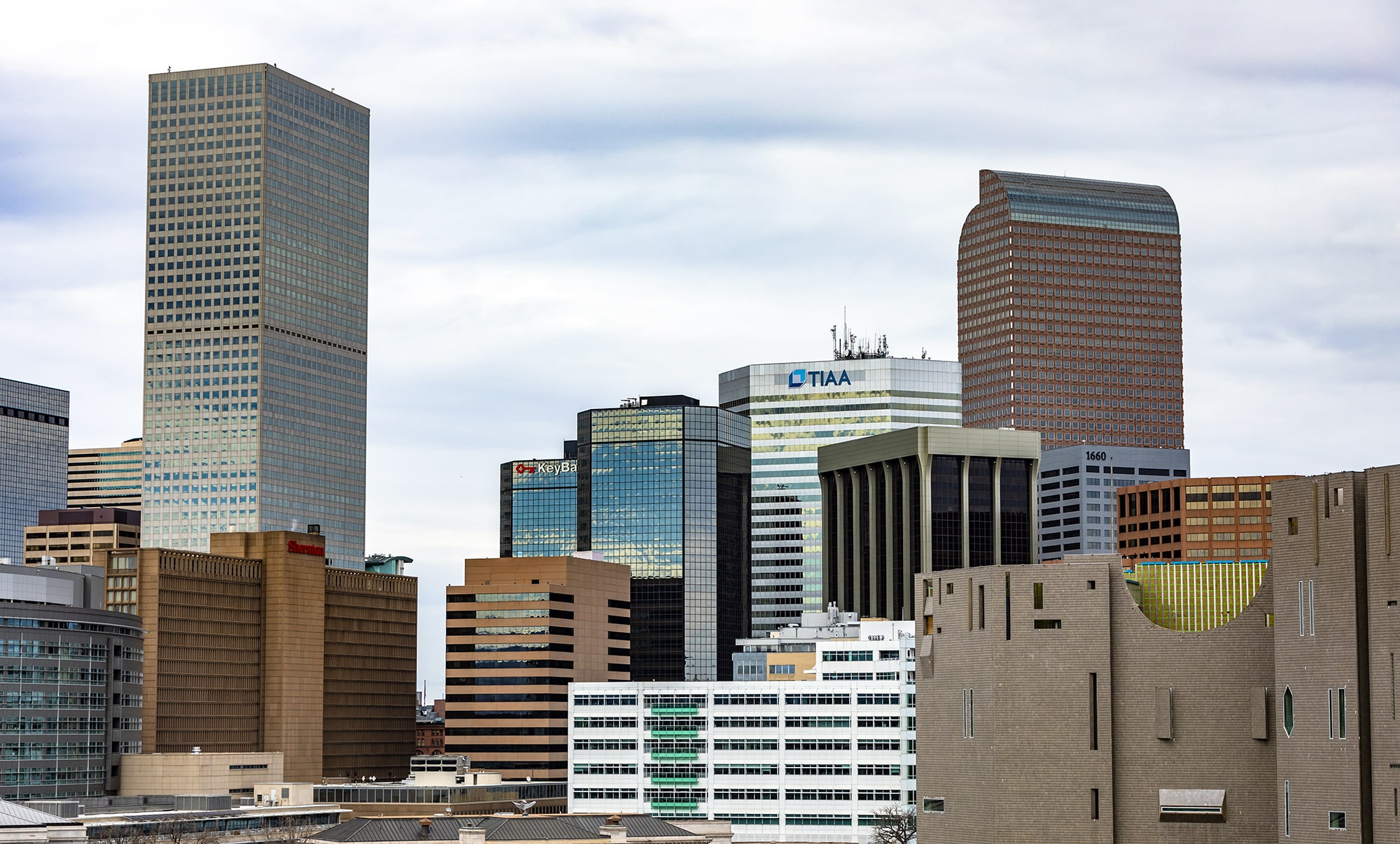
A view of the downtown Denver skyline. (Courtesy Guerilla Capturing)
If you work in a Denver-area office building, it’s increasingly likely that your company’s landlord has reluctantly found itself in that position.
As the first quarter drew to a close, at least 25 major office properties across the Denver area were outright owned by a lender, thanks to a foreclosure or deed-in-lieu of foreclosure, or effectively controlled by one, due to the appointment of a receiver.
“Most of the lenders are in the business of lending money, and not in the business of owning real estate. So their goal is to minimize the losses,” said Craig Allely, a Denver attorney with Perkins Coie who represents lenders and loan servicers.
The latest property to go back to a lender was Market Center, a 121,000-square-foot complex in the 1600 block of Market Street downtown that dates to the late 1800s. Before that, it was a new build: RiNo’s Hub North, a 111,000-square-foot structure completed in 2020.
Lenders can take buildings back when their owner defaults on a loan, either by not making payments or — more commonly in the current environment — by failing to pay the loan off when it comes due.
Unlike a typical homeowner’s loan, the eight- and nine-figure loans backed by major commercial properties like office towers aren’t designed to gradually be paid off. Instead, owners often just pay interest. When the maturity date is reached, the loan must be repaid in full. An owner might sell the property to do so, or take out a huge new loan.
That model worked well during the 2010s. But it is designed around one key assumption: that buildings will become more valuable over time.
The pandemic and its fallout, however, had a drastic impact on the office sector. Demand for space has dropped, making buildings less valuable, while interest rates have risen, making it more difficult to secure a new loan.
And, increasingly, lenders have found themselves in control. In addition to taking ownership of buildings directly, they sometimes get judges to appoint a receiver to oversee a property. While receivers technically report to the judge, they’re really working to preserve the building’s value for the lender.
The Wells Fargo Center, Denver’s most well-known skyscraper, has been in receivership for a year and a half, since August 2023. A dozen other local office properties are also overseen by a receiver.

Craig Allely
Allely said lenders have four main options when a loan default happens or is expected.
First, they can modify the loan, extending the maturity date and changing other factors like interest rate. Second, they can sell the loan to someone who wants to own the tower. Third, they can foreclose on the property through a county-run auction. Or fourth, they can execute a deed-in-lieu of foreclosure, taking ownership without going through the formal process.
While deed-in-lieu sounds simple — both sides know the building is going to the lender, so why not just do it quickly — Allely said attorneys often advocate for formal foreclosure.
That’s because the foreclosure process generally negates any liens that might have been filed against the property — say, by a contractor that didn’t get paid.
“You get clean title from foreclosure,” he said. “Basically the only thing you can’t foreclose out of is taxes.”
Additionally, Allely said Colorado’s foreclosure process, which is managed by county trustees, is well-regarded.
“It’s pretty efficient, it’s pretty fair and it’s got strict deadlines. … It’s reasonably quick — should be four months or something like that — and it’s clean title,” he said.
In theory, anyone can bid at a foreclosure auction. But no one is showing up to buy Denver’s office buildings. Market Center was auctioned in March. Trinity Place, at 1801 Broadway, was auctioned in November. A pair of buildings in Glendale were auctioned in October. A building in Centennial was auctioned in September.
In all, six local office properties have been foreclosed on since 2022. In each case, there were no bids besides the “credit bid” from the lender.
That could reflect low demand for office buildings. But Allely said it more likely reflects the fact that potential buyers often don’t know that much about a building’s specific financials. At best, if a receiver is in place, there might be some reports filed in court.
“They really want to come in and do due diligence,” he said of potential buyers. “That information is just not available to them.”
Allely said deed-in-lieu of foreclosure is seen more often in other states that don’t have as efficient a public trustee process as Colorado. The process doesn’t naturally wipe the title clean, and thus can involve more negotiations.
Still, seven local office buildings have undergone deed-in-lieu in the past six months. Hub North was a deed-in-lieu, handed over in March. RiNo’s Rev360, unoccupied since its 2020 completion, was handed over in December. The tower at 1660 Lincoln St. downtown was handed over in February, three months after Civic Center Plaza across the street.
When lenders take over a property, they often try to sell it, typically after addressing any immediate needs.
“That’s a term they always use — stabilize the building,” Allely said.
But there’s no guarantee of a quick sale. Denver Energy Center, a two-tower complex at 1625 and 1675 Broadway, was the first post-COVID office foreclosure. Chase Bank took it back in June 2022. It has yet to find a buyer.
The 785,000-square-foot complex is just 31% leased, according to CBRE marketing materials. Jenny Knowlton, who is marketing it for sale alongside colleagues Charley Will and Chad Flynn, is also trying to find a buyer for Rev360 and Hub North. Both of those were for sale even before they went back to the lender.
“A lot of times we will get hired in long before there is a deed-in-lieu or foreclosure,” Knowlton said.
Previous owners are reluctant to spend money to boost the value of a property that has fallen below its loan value. But new owners, who can buy at rock-bottom price points, are newly incentivized to invest. And there are interest parties out there, according to Knowlton.
“There’s a whole subset of buyers out there, that all they want is distressed real estate,” she said.

Jenny Knowlton
In the long run, however, the value of Denver’s office real estate is contingent on demand from companies for the space itself. Downtown was just shy of 35% vacant at the end of last year, counting subleases available.
“So much of this depends on leasing,” Knowlton said.
Allely, who was directly involved in the Denver Energy Center and Trinity Place foreclosures, said he started doing this type of work around 2010, in the wake of the financial crisis. There were foreclosures and deeds-in-lieu then as well.
“We haven’t gotten to those levels yet,” he said.
Embracing a baseball metaphor, he said he thinks downtown is the bottom of the sixth inning when it comes to distress.
“Our starter has thrown 100 pitches, and we’ve started to look at the bullpen,” Allely said.
A couple runners are on base and the bottom of the order is up, he continued. So, there’s hope that things could end without too much more pain. But one hit and the top of the order is up.
“I think we’re nervous about our bullpen. … We’re not at the point of bringing in one of our utility infielders to pitch.”
Read more: Troubled towers: Breaking down Denver’s distressed office properties

A view of the downtown Denver skyline. (Courtesy Guerilla Capturing)
If you work in a Denver-area office building, it’s increasingly likely that your company’s landlord has reluctantly found itself in that position.
As the first quarter drew to a close, at least 25 major office properties across the Denver area were outright owned by a lender, thanks to a foreclosure or deed-in-lieu of foreclosure, or effectively controlled by one, due to the appointment of a receiver.
“Most of the lenders are in the business of lending money, and not in the business of owning real estate. So their goal is to minimize the losses,” said Craig Allely, a Denver attorney with Perkins Coie who represents lenders and loan servicers.
The latest property to go back to a lender was Market Center, a 121,000-square-foot complex in the 1600 block of Market Street downtown that dates to the late 1800s. Before that, it was a new build: RiNo’s Hub North, a 111,000-square-foot structure completed in 2020.
Lenders can take buildings back when their owner defaults on a loan, either by not making payments or — more commonly in the current environment — by failing to pay the loan off when it comes due.
Unlike a typical homeowner’s loan, the eight- and nine-figure loans backed by major commercial properties like office towers aren’t designed to gradually be paid off. Instead, owners often just pay interest. When the maturity date is reached, the loan must be repaid in full. An owner might sell the property to do so, or take out a huge new loan.
That model worked well during the 2010s. But it is designed around one key assumption: that buildings will become more valuable over time.
The pandemic and its fallout, however, had a drastic impact on the office sector. Demand for space has dropped, making buildings less valuable, while interest rates have risen, making it more difficult to secure a new loan.
And, increasingly, lenders have found themselves in control. In addition to taking ownership of buildings directly, they sometimes get judges to appoint a receiver to oversee a property. While receivers technically report to the judge, they’re really working to preserve the building’s value for the lender.
The Wells Fargo Center, Denver’s most well-known skyscraper, has been in receivership for a year and a half, since August 2023. A dozen other local office properties are also overseen by a receiver.

Craig Allely
Allely said lenders have four main options when a loan default happens or is expected.
First, they can modify the loan, extending the maturity date and changing other factors like interest rate. Second, they can sell the loan to someone who wants to own the tower. Third, they can foreclose on the property through a county-run auction. Or fourth, they can execute a deed-in-lieu of foreclosure, taking ownership without going through the formal process.
While deed-in-lieu sounds simple — both sides know the building is going to the lender, so why not just do it quickly — Allely said attorneys often advocate for formal foreclosure.
That’s because the foreclosure process generally negates any liens that might have been filed against the property — say, by a contractor that didn’t get paid.
“You get clean title from foreclosure,” he said. “Basically the only thing you can’t foreclose out of is taxes.”
Additionally, Allely said Colorado’s foreclosure process, which is managed by county trustees, is well-regarded.
“It’s pretty efficient, it’s pretty fair and it’s got strict deadlines. … It’s reasonably quick — should be four months or something like that — and it’s clean title,” he said.
In theory, anyone can bid at a foreclosure auction. But no one is showing up to buy Denver’s office buildings. Market Center was auctioned in March. Trinity Place, at 1801 Broadway, was auctioned in November. A pair of buildings in Glendale were auctioned in October. A building in Centennial was auctioned in September.
In all, six local office properties have been foreclosed on since 2022. In each case, there were no bids besides the “credit bid” from the lender.
That could reflect low demand for office buildings. But Allely said it more likely reflects the fact that potential buyers often don’t know that much about a building’s specific financials. At best, if a receiver is in place, there might be some reports filed in court.
“They really want to come in and do due diligence,” he said of potential buyers. “That information is just not available to them.”
Allely said deed-in-lieu of foreclosure is seen more often in other states that don’t have as efficient a public trustee process as Colorado. The process doesn’t naturally wipe the title clean, and thus can involve more negotiations.
Still, seven local office buildings have undergone deed-in-lieu in the past six months. Hub North was a deed-in-lieu, handed over in March. RiNo’s Rev360, unoccupied since its 2020 completion, was handed over in December. The tower at 1660 Lincoln St. downtown was handed over in February, three months after Civic Center Plaza across the street.
When lenders take over a property, they often try to sell it, typically after addressing any immediate needs.
“That’s a term they always use — stabilize the building,” Allely said.
But there’s no guarantee of a quick sale. Denver Energy Center, a two-tower complex at 1625 and 1675 Broadway, was the first post-COVID office foreclosure. Chase Bank took it back in June 2022. It has yet to find a buyer.
The 785,000-square-foot complex is just 31% leased, according to CBRE marketing materials. Jenny Knowlton, who is marketing it for sale alongside colleagues Charley Will and Chad Flynn, is also trying to find a buyer for Rev360 and Hub North. Both of those were for sale even before they went back to the lender.
“A lot of times we will get hired in long before there is a deed-in-lieu or foreclosure,” Knowlton said.
Previous owners are reluctant to spend money to boost the value of a property that has fallen below its loan value. But new owners, who can buy at rock-bottom price points, are newly incentivized to invest. And there are interest parties out there, according to Knowlton.
“There’s a whole subset of buyers out there, that all they want is distressed real estate,” she said.

Jenny Knowlton
In the long run, however, the value of Denver’s office real estate is contingent on demand from companies for the space itself. Downtown was just shy of 35% vacant at the end of last year, counting subleases available.
“So much of this depends on leasing,” Knowlton said.
Allely, who was directly involved in the Denver Energy Center and Trinity Place foreclosures, said he started doing this type of work around 2010, in the wake of the financial crisis. There were foreclosures and deeds-in-lieu then as well.
“We haven’t gotten to those levels yet,” he said.
Embracing a baseball metaphor, he said he thinks downtown is the bottom of the sixth inning when it comes to distress.
“Our starter has thrown 100 pitches, and we’ve started to look at the bullpen,” Allely said.
A couple runners are on base and the bottom of the order is up, he continued. So, there’s hope that things could end without too much more pain. But one hit and the top of the order is up.
“I think we’re nervous about our bullpen. … We’re not at the point of bringing in one of our utility infielders to pitch.”
Read more: Troubled towers: Breaking down Denver’s distressed office properties


